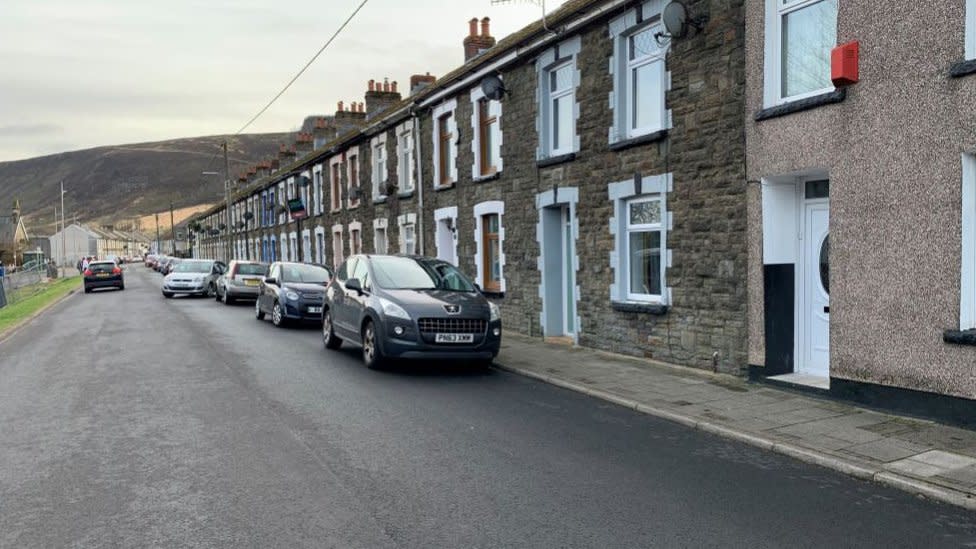Maerdy’s coal mine has gone but its heart remains

One is home to world-famous fashion retailer, the other feels forgotten – this is the differing tale of two coal communities now the mines have gone.
More than 4,500 people work at Asos’s distribution centre in Grimethorpe – more than that who live in the former south Wales mining village of Maerdy.
How well they’ve responded to losing their mine, the old village heartbeat, depends on your barometer of success.
Is getting bigger better, or is it all about a tight-knit community spirit?
A quarter of the Welsh population live in former coalfield communities and near the head of the Rhondda Valley in Maerdy, there’s a few shops, takeaways, a pub and one road in and one road out.
On a busy day, it can take almost two-and-a-half hours on public transport to get the nearest big city, so locals say people have to move away from their community to get work.

Roads, railway lines and more importantly industry – or jobs – never arrived after the pit shut in 1990, five years after miners went back to work following the miners’ strike.
“Lots of things were promised, but not a lot of things came to the valley,” said Dawn Wood, who was deputy head at Maerdy Primary for 45 years, including during the strike.
“That is a condemnation of any government, whether it’s Labour, Conservative, every government. I cannot blame one more than the other.”
Coal has been at the heart of everything in Maerdy for more than 100 years – livelihoods, the social and sporting scene. The mine was the community.

When miners marched back to work at the local mine in 1985 after the strike, it was the beginning of the end for coal mining in the village.
The town walked in lockstep with the miners, accompanied by a brass band, but within five years the pit was gone for good – and Dawn, now in her 60s, reckons the village’s fortunes have steadily declined.
“It is the lack of foresight, they promise things but they don’t put it in,” said Dawn.
“So as far as I’m concerned it is not the people that have let the valleys down, it is governments that have let the valleys down.”
Dawn isn’t alone as a new BBC survey suggests three in five people said closing the pits had a negative impact on their area – and almost three-quarters polled said they’d seen little or no regeneration.

“Shops have closed, everybody had to go out of the valley to work… It’s all gone, it’s not the same,” said lifelong Maerdy resident Phil Pugh.
There is also more deprivation, higher unemployment and poorer health, and new research estimates nearly 20% of people are out of work in the village deep in the Rhondda Fach Valley.
“We haven’t got a train, they promised a new road that was supposed to come all the way up to Maerdy, but it only came up as far as Pontygwaith,” said Gill Owen and Trina Coombs, who join the Knit and Natter group in Maerdy every Tuesday.
“You’ve got one road in and one road out. Big businesses will not come up here, because of the cost of their travelling time. If there’s an accident, you can’t get out.

“Last year the workmens’ club in Tylorstown got burnt down. We were stuck for four days.”
While the last four decades haven’t been kind to Maerdy, some former coalfield communities have flourished.
Miners in the Yorkshire village Grimethorpe in south Yorkshire marched back to work around the same time as those in Maerdy, also accompanied by their own brass band made famous by the Ewan McGregor film Brassed Off.
Grimethorpe’s pit shut in 1993 – and within a year the village near Barnsley was considered the poorest in the UK with half the workforce unemployed.
“Let’s be blunt, the government walked away – it devastated that community and said goodbye… and in a sense everything just imploded,” said Sir Stephen Houghton, head of the multi-agency Grimethorpe Regeneration Board.
“This wasn’t miners losing a few jobs, they lost a whole way of life. Everything disappeared overnight. Society in the village started to break down. Crime and disorder went through the roof.”
But a £100m injection built new roads, attracted industry including international fashion retailer Asos, and Grimethorpe – about halfway between Leeds and Sheffield – has grown.

“We had to show the people of Grimethorpe, that…
Read More: Maerdy’s coal mine has gone but its heart remains

